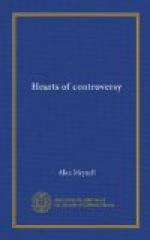As for Wordsworth, the most beautiful stanzas of “Hartleap Well” are fatally rebuked by the truths of Nature. He shows us the ruins of an aspen wood, a blighted hollow, a dreary place, forlorn because an innocent stag, hunted, had there broken his heart in a leap from the rocks above; grass would not grow there.
This beast not unobserved by Nature
fell,
His death was mourned by sympathy
divine.
And the signs of that sympathy are cruelly asserted by the poet to be these woodland ruins—cruelly, because the daily sight of the world blossoming over the agonies of beast and bird is made less tolerable to us by such a fiction.
The Being that is in the clouds and air . . . Maintains a deep and reverential care For the unoffending creature whom He loves.
The poet offers us as a proof of that “reverential care,” the visible alteration of Nature at the scene of suffering—an alteration we have to dispense with every day we pass in the woods. We are tempted to ask whether Wordsworth himself believed in a sympathy he asks us—on such grounds!—to believe in? Did he think his faith to be worthy of no more than a fictitious sign and a false proof?
Nowhere in the whole of Tennyson’s thought is there such an attack upon our reason and our heart. He is more serious than the solemn Wordsworth.
In Memoriam, with all else that Tennyson wrote, tutors, with here and there a subtle word, this nature-loving nation to perceive land, light, sky, and ocean, as he perceived. To this we return, upon this we dwell. He has been to us, firstly, the poet of two geniuses—a small and an immense; secondly, the modern poet who answered in the negative that most significant modern question, French or not French? But he was, before the outset of all our study of him, of all our love of him, the poet of landscape, and this he is more dearly than pen can describe him. This eternal character of his is keen in the verse that is winged to meet a homeward ship with her “dewy decks,” and in the sudden island landscape,
The clover sod,
That takes the sunshine and the
rains,
Or where the kneeling hamlet drains
The chalice of the grapes of God.
It is poignant in the garden-night:-
A breeze began to tremble o’er The large leaves of the sycamore, . . . And gathering freshlier overhead, Rocked the full-foliaged elm, and swung The heavy-folded rose, and flung The lilies to and fro, and said “The dawn, the dawn,” and died away.
His are the exalted senses that sensual poets know nothing of. I think the sense of hearing as well as the sense of sight, has never been more greatly exalted than by Tennyson:-
As from beyond the limit of the
world,
Like the last echo born of a great
cry.




